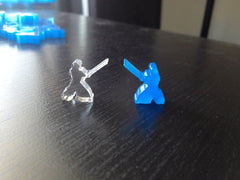This year, Yomi's Gate was nominated in the South by Southwest Gaming Awards. I'll be showcasing the game at the festival from March 13th through March 15th 2015. Between now and then, I'll be writing a series of articles discussing the game, where it came from, how it was made, and the kinds of challenges I've encountered along the way. This is one of those articles.
At any given time, someone who makes things has so many ideas, it's remarkable that anything gets done at all. I've learned that along the way, it's helpful to ask the question, "Why am I doing this and not something else?" Even now, when Yomi's Gate is my focus, I have ideas kicking around for new factions, new terrains, a game about potion-making, a turn-based RPG, a procedural action shooter, and an action platformer. Those are just skimming the surface, too, and I'm certain that other designers have even more going on than that.
Yomi's Gate came about because it was the intersection of criticism and opportunity. I grew up on strategy and war games thanks to my dad, including Feudal, Risk, Axis & Allies, Chess, Stratego, and tons of others. Over the years, several recurring thoughts happened:
- Not only is long setup time boring, it's actually a barrier to play. The time from box to play was directly related to how often those games were played. Axis & Allies, for instance, took hours to set up and almost never got played.
- Some environmental randomness was beneficial, but randomness that directly altered the results of player action could be terrible. It isn't fun to march in with an army of 20 in Risk and lose to an army of 3 because they get good rolls of the dice and you don't.
- Games that take forever to play are just as infrequently played as games that take forever to set up. Just knowing that a game could take 3+ hours to complete is often a deterrent to play even if the game is quickly set up. It's often better to play several short games than one long game.
Now these criticisms are well and good, but without an actual game addressing them, they're just these ethereal concepts that are, well, kind of worthless. An idea is only as good as its execution, so for a long time I had no clear plan for execution to take these concepts into some game that made sense. They were more of a disposition than anything else.
Sometime last year, I got a laser. With it, I found I could engrave and cut all sorts of materials and it quickly became apparent to me that I could use it to make board game pieces. I prototyped basic meeples, tried more detailed designs, and soon created the first functional version of what would become the Yomi's Gate samurai piece.

I couldn't make dice, I couldn't print anything on paper or cardboard, and I couldn't make any 3D pieces that weren't just 2D designs with depth, so my options were pretty limited. It just made sense that without dice or cards, a deterministic game that addressed all of my previous strategy game criticisms would be a good choice. I would make a game that could be set up quickly, played with minimum environmental randomness, and played quickly. This would be something I could play with my dad.
So really, Yomi's Gate is the game I decided to make for two reasons:
- I had been brewing general strategy game concepts for a long, long time.
- I suddenly had the tools to make a strategy game, but not a whole lot else.
Compared to any other idea I have, having the ideas and means meet each other so perfectly made it clear that Yomi's Gate was what I should be working on.